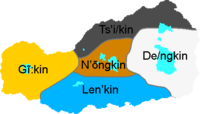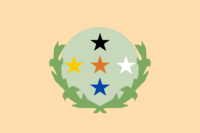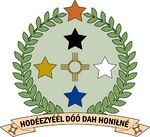Tsinkin: Difference between revisions
Mokingpudova (talk | contribs) No edit summary |
No edit summary |
||
| (58 intermediate revisions by 4 users not shown) | |||
| Line 1: | Line 1: | ||
{{Infobox country | {{Infobox country | ||
|native_name = <!--e.g. France--> | |native_name = <!--e.g. France--> Ts'inkin | ||
|conventional_long_name = <!--Conventional English long-form--> The | |conventional_long_name = <!--Conventional English long-form--> The Nõng Republic of Tsinkin | ||
|common_name = <!--Common English name--> | |common_name = <!--Common English name--> Tsinkin | ||
|image_flag = <!--* e.g. Flag of country.svg--> [[File: | |image_flag = <!--* e.g. Flag of country.svg--> [[File:Tsinkin Flag.png|200px]] | ||
|alt_flag = <!--Alt text--> Flag of | |alt_flag = <!--Alt text--> Flag of Ts'inkin | ||
|image_coat = <!--* e.g. Coat of arms of country.svg--> | |image_coat = <!--* e.g. Coat of arms of country.svg--> [[File:Tsinkin Coat-compressed.jpg|150px]] | ||
|alt_coat = <!--alt text for coat of arms--> | |alt_coat = <!--alt text for coat of arms--> | ||
|symbol_type = <!--emblem/seal/... based on image_coat--> | |symbol_type = <!--emblem/seal/... based on image_coat--> | ||
|national_motto = <!--"[[motto]]"--> "[[ | |national_motto = <!--"[[motto]]"--> "[[hodéezyéél dóó dah honiłné]]" | ||
|national_anthem = <!--''[[name of/link to anthem]]''--> | |national_anthem = <!--''[[name of/link to anthem]]''--> | ||
|royal_anthem = <!--''[[name of/link to anthem]]''--> | |royal_anthem = <!--''[[name of/link to anthem]]''--> | ||
|other_symbol_type = <!--Another symbol, e.g. Hymn--> | |other_symbol_type = <!--Another symbol, e.g. Hymn--> | ||
|other_symbol = <!--another symbol text--> | |other_symbol = <!--another symbol text--> | ||
|image_map = <!--e.g. LocationCountry.svg--> [[File: | |image_map = <!--e.g. LocationCountry.svg--> [[File:TsinkinProvinces.png|200px]] | ||
|alt_map = <!--alt text for map--> | |alt_map = <!--alt text for map--> Map of Ts'inkin | ||
|map_caption = <!--Caption to place below map--> | |map_caption = <!--Caption to place below map--> Map of Ts'inkin | ||
|image_map2 = <!--Another map, if required--> | |image_map2 = <!--Another map, if required--> | ||
|alt_map2 = <!--alt text for second map--> | |alt_map2 = <!--alt text for second map--> | ||
|map_caption2 = <!--Caption to place below second map--> | |map_caption2 = <!--Caption to place below second map--> | ||
|capital = <!--e.g. Paris--> | |capital = <!--e.g. Paris--> [[N’õngkinkin]] | ||
|latd= | latm= | latNS = <!--capital's latitude degree/min/dir--> | |latd= | latm= | latNS = <!--capital's latitude degree/min/dir--> | ||
|longd= |longm= |longEW = <!--capital's longitude deg/min/dir--> | |longd= |longm= |longEW = <!--capital's longitude deg/min/dir--> | ||
|largest_city = <!--Largest city or settlement: --> | |largest_city = <!--Largest city or settlement: --> [[N’õngkinkin]] | ||
|largest_settlement = <!--(if not a city)--> | |largest_settlement = <!--(if not a city)--> | ||
|largest_settlement_type = <!--Type of settlement if largest settlement not a city--> | |largest_settlement_type = <!--Type of settlement if largest settlement not a city--> | ||
|official_languages = <!--e.g. English, French--> None | |official_languages = <!--e.g. English, French--> None | ||
|national_languages = <!--Officially recognized national languages--> | |national_languages = <!--Officially recognized national languages--> Diné, English | ||
|regional_languages = <!--Officially recognized regional languages--> | |regional_languages = <!--Officially recognized regional languages--> | ||
|languages_type = <!--Other type of languages --> | |languages_type = <!--Other type of languages --> | ||
|languages = <!--Other languages list--> | |languages = <!--Other languages list--> | ||
|ethnic_groups = <!--List/breakdown of ethnic groups--> | |ethnic_groups = <!--List/breakdown of ethnic groups--> | ||
|ethnic_groups_year = <!--Year of ethnic data (if provided)--> | |ethnic_groups_year = <!--Year of ethnic data (if provided)--> | ||
|demonym = <!--e.g. American--> | |demonym = <!--e.g. American--> Tsinkinian | ||
|government_type = | |government_type = Federalist Social Democracy | ||
|leader_title1 = <!-- e.g. President--> President | |leader_title1 = <!-- e.g. President--> President | ||
|leader_name1 = <!-- e.g. Barack Obama--> | |leader_name1 = <!-- e.g. Barack Obama--> Haseya Nakai | ||
|leader_title2 = | |leader_title2 = | ||
|leader_name2 = | |leader_name2 = | ||
|leader_title6 = | |leader_title6 = | ||
|leader_name6 = | |leader_name6 = | ||
| Line 51: | Line 51: | ||
|area_magnitude = | |area_magnitude = | ||
|area = <!-- major area size (in [[Template:convert]] either km2 or sqmi first) --> | |area = <!-- major area size (in [[Template:convert]] either km2 or sqmi first) --> | ||
|area_km2 = <!-- major area size (in square km) --> | |area_km2 = <!-- major area size (in square km) --> 1,498,048 | ||
|area_sq_mi = <!-- area in square mi (requires area_km2) --> | |area_sq_mi = <!-- area in square mi (requires area_km2) --> | ||
|area_footnote = <!-- optional footnote for area --> | |area_footnote = <!-- optional footnote for area --> | ||
| Line 61: | Line 61: | ||
|population_estimate_rank = | |population_estimate_rank = | ||
|population_estimate_year = | |population_estimate_year = | ||
|population_census = | |population_census = | ||
|population_census_year = | |population_census_year = | ||
|population_density_km2 = | |population_density_km2 = | ||
|population_density_sq_mi = | |population_density_sq_mi = | ||
| Line 71: | Line 71: | ||
|GDP_PPP_per_capita = | |GDP_PPP_per_capita = | ||
|GDP_PPP_per_capita_rank = | |GDP_PPP_per_capita_rank = | ||
|GDP_nominal = | |GDP_nominal = US$448 Billion | ||
|GDP_nominal_rank = | |GDP_nominal_rank = | ||
|GDP_nominal_year = | |GDP_nominal_year = 2020 | ||
|GDP_nominal_per_capita = | |GDP_nominal_per_capita = US$77,710.32 | ||
|GDP_nominal_per_capita_rank = | |GDP_nominal_per_capita_rank = | ||
|Gini = | |Gini = | ||
| Line 86: | Line 86: | ||
|HDI_change = <!--increase/decrease/stable--> | |HDI_change = <!--increase/decrease/stable--> | ||
|HDI_category = | |HDI_category = | ||
|currency = | |currency = Béeso | ||
|currency_code = | |currency_code = BSO | ||
|time_zone = | |time_zone = | ||
|utc_offset = <!-- +N, where N is number of hours--> | |utc_offset = <!-- +N, where N is number of hours--> +6 | ||
|time_zone_DST = | |time_zone_DST = | ||
|antipodes = <!-- countries or islands antipodal to this one--> | |antipodes = <!-- countries or islands antipodal to this one--> | ||
|date_format = <!-- numeric dates (dd-mm-yyyy, yyyy.mm.dd, etc.) plus era (AD, AH, etc.) --> | |date_format = <!-- numeric dates (dd-mm-yyyy, yyyy.mm.dd, etc.) plus era (AD, AH, etc.) --> dd-mm-yyyy | ||
|DST_note = | |DST_note = | ||
|utc_offset_DST = <!-- +N, where N is number of hours--> | |utc_offset_DST = <!-- +N, where N is number of hours--> | ||
|drives_on = <!-- vehicles drive on the left or right of the road --> Right | |drives_on = <!-- vehicles drive on the left or right of the road --> Right | ||
|cctld = . | |cctld = .tsk | ||
|iso3166code = | |iso3166code = TK | ||
|calling_code = | |calling_code = | ||
|image_map3 = | |image_map3 = | ||
|alt_map3 = | |alt_map3 = | ||
| Line 108: | Line 108: | ||
}} | }} | ||
' | Ts'inkin, officially The Commonwealth of Ts'inkin, is a country located in the eastern continent of [[Anteria]]. Ts'inkin is made up of 4 different provinces ([[Tsʼi/kin]],[[Len'kin]], [[De/ngkin]], & [[Gĩ:kin]].) and 1 capital province ([[N’õngkin]]). Its is known for its vast prairies and farmland. Ts'inkins main exports are Cotton and Corn but is also the #1 exporter of [[wikipedia:Turqoise|Turqoise]] Jewelry in Anteria and has signifigant Thorium deposits. | ||
==History== | ==History== | ||
==Geography== | ==Geography== | ||
===Climate=== | ===Climate=== | ||
===Environment=== | ===Environment=== | ||
===Mineral Commodities=== | |||
[[File:Thorium.png|thumb|Thorium Mines]] | |||
* Turquoise | |||
* Cobalt | |||
* Coal | |||
* Copper | |||
* Iron | |||
* Potassium | |||
* Silica | |||
* Thorium | |||
==Fauna== | |||
===Animals=== | |||
[[File:Domesticated Wool Bison.png|thumb|Difference of the Wild Bison and the Domesticated Wool Bison]] | |||
Common Tsinkinian animals include the national animal, The Wild Bison, [[Tsinkin Domesticated Bison|Domesticated Bison]], Rabbit, Praire Dogs, Coyotes, bobcats, Golden Eagle, Red-Tailed Hawk, Black Bear, Mule Deer, and Elk. | |||
===Plants=== | |||
==Politics and Government== | ==Politics and Government== | ||
| Line 137: | Line 153: | ||
===Religion=== | ===Religion=== | ||
Tsinkins Religion "Hloõnch’e | |||
===Culture=== | ===Culture=== | ||
Ts'inkin culture is primarily based on their holy number 4, in which the 4 cardinal directions and the 4 sacred colors are linked. This is not to be confused with the Tsinkin traditional medicine wheel. | |||
•'''North''': Represents Manhood, the color black, and night. | |||
•'''South''': Representss Boyhood, the color blue, and day. | |||
•'''East''': Representss Womanhood, the color white, and dusk. | |||
•'''West''': Representss Girlhood, the color Yellow, and dawn. | |||
====Music and Art==== | ====Music and Art==== | ||
====Cuisine==== | ====Cuisine==== | ||
[[Tsinkin]] food consists of 4 principles, '''Protein, Corn/Wheat, Vegetables, Dairy.''' | |||
'''Morning''' ● on average would consist of a blue cornmeal soup along or inside the soup is vegetables such as celery or onion. Berry's are also very common at the breakfast table, Juniper berries, Wolfberry (or more commonly known as gogi berry), or Sumac berries to name a few. Goat milk pancakes and goat cheese are also enjoyed at the morning table. | |||
'''Afternoon''' ● on average it includes a blue cornmeal mush made of water, blue cornmeal, and juniper tree ash. Alongside the mush are wheat breads and meat, commonly either bison or rabbit. Other forms of meat that are eaten are the rest of the bison, no meat is wasted and markets regularly sell bisons head and organs or blood sausage. Aside from meat pine nuts, pinto beans, and squash seed are all sources of protein for Ts'inkinian people. Fruits such as Berries and even boiled, dried-apricots are eaten as well. | |||
'''Drinks''' ● Ts'inkinian's mostly drink goats milk, traditional teas, and sometimes regular coffee. | |||
'''Special Occasions''' ● On special occasions (birthdays, holidays, graduation, ect.) Tsinkinians will eat lots of Fry Bread, a famous bread tied to the Tsinkinian people. The bread is made like a normal flat bread but then fried in animal lard. It is soft, airy, and chewy, with a bit of sweetness. It can be topped with meat and vegetables, or it can be drizzled with honey and powdered sugar to become a dessert. They will also eat Ts'inkin Coffee, a dish made out of normal coffee, golden toasted flower, and sugar. It has a very thick consistency much akin to the blue cornmeal mush. | |||
'''Extras''' ● Edible clay and Juniper tree ash is often added to enhance calcium and nutritional levels in food. Juniper Ash is more commonly used and can be bought at most Ts'inkinian markets while edible clay has to be harvested. | |||
====Sports==== | ====Sports==== | ||
<Gallery Mode="slideshow"> | |||
File:Navajo Woman.jpg|Traditional Womans Dress | |||
File:Mesa navajo.png|Traditional Mens Dress | |||
</Gallery> | |||
[[Category:Anteria]] | |||
{{Template:Tsinkin info pages}} | |||
{{Template:Anteria info pages}} | |||
Latest revision as of 17:39, 3 September 2021
The Nõng Republic of Tsinkin Ts'inkin | |
|---|---|
| Motto: "hodéezyéél dóó dah honiłné" | |
 Map of Ts'inkin | |
| Capital and | N’õngkinkin |
| Official languages | None |
| Recognised national languages | Diné, English |
| Demonym(s) | Tsinkinian |
| Government | Federalist Social Democracy |
• President | Haseya Nakai |
| Area | |
• | 1,498,048 km2 (578,400 sq mi) |
| GDP (nominal) | 2020 estimate |
• Total | US$448 Billion |
• Per capita | US$77,710.32 |
| Currency | Béeso (BSO) |
| Time zone | UTC+6 |
| Date format | dd-mm-yyyy |
| Driving side | right |
| ISO 3166 code | TK |
| Internet TLD | .tsk |
Ts'inkin, officially The Commonwealth of Ts'inkin, is a country located in the eastern continent of Anteria. Ts'inkin is made up of 4 different provinces (Tsʼi/kin,Len'kin, De/ngkin, & Gĩ:kin.) and 1 capital province (N’õngkin). Its is known for its vast prairies and farmland. Ts'inkins main exports are Cotton and Corn but is also the #1 exporter of Turqoise Jewelry in Anteria and has signifigant Thorium deposits.
History
Geography
Climate
Environment
Mineral Commodities
- Turquoise
- Cobalt
- Coal
- Copper
- Iron
- Potassium
- Silica
- Thorium
Fauna
Animals
Common Tsinkinian animals include the national animal, The Wild Bison, Domesticated Bison, Rabbit, Praire Dogs, Coyotes, bobcats, Golden Eagle, Red-Tailed Hawk, Black Bear, Mule Deer, and Elk.
Plants
Politics and Government
Military
Foreign Relations
Infrastructure
Demographics
Education
Religion
Tsinkins Religion "Hloõnch’e
Culture
Ts'inkin culture is primarily based on their holy number 4, in which the 4 cardinal directions and the 4 sacred colors are linked. This is not to be confused with the Tsinkin traditional medicine wheel.
•North: Represents Manhood, the color black, and night.
•South: Representss Boyhood, the color blue, and day.
•East: Representss Womanhood, the color white, and dusk.
•West: Representss Girlhood, the color Yellow, and dawn.
Music and Art
Cuisine
Tsinkin food consists of 4 principles, Protein, Corn/Wheat, Vegetables, Dairy.
Morning ● on average would consist of a blue cornmeal soup along or inside the soup is vegetables such as celery or onion. Berry's are also very common at the breakfast table, Juniper berries, Wolfberry (or more commonly known as gogi berry), or Sumac berries to name a few. Goat milk pancakes and goat cheese are also enjoyed at the morning table.
Afternoon ● on average it includes a blue cornmeal mush made of water, blue cornmeal, and juniper tree ash. Alongside the mush are wheat breads and meat, commonly either bison or rabbit. Other forms of meat that are eaten are the rest of the bison, no meat is wasted and markets regularly sell bisons head and organs or blood sausage. Aside from meat pine nuts, pinto beans, and squash seed are all sources of protein for Ts'inkinian people. Fruits such as Berries and even boiled, dried-apricots are eaten as well.
Drinks ● Ts'inkinian's mostly drink goats milk, traditional teas, and sometimes regular coffee.
Special Occasions ● On special occasions (birthdays, holidays, graduation, ect.) Tsinkinians will eat lots of Fry Bread, a famous bread tied to the Tsinkinian people. The bread is made like a normal flat bread but then fried in animal lard. It is soft, airy, and chewy, with a bit of sweetness. It can be topped with meat and vegetables, or it can be drizzled with honey and powdered sugar to become a dessert. They will also eat Ts'inkin Coffee, a dish made out of normal coffee, golden toasted flower, and sugar. It has a very thick consistency much akin to the blue cornmeal mush.
Extras ● Edible clay and Juniper tree ash is often added to enhance calcium and nutritional levels in food. Juniper Ash is more commonly used and can be bought at most Ts'inkinian markets while edible clay has to be harvested.
Sports





